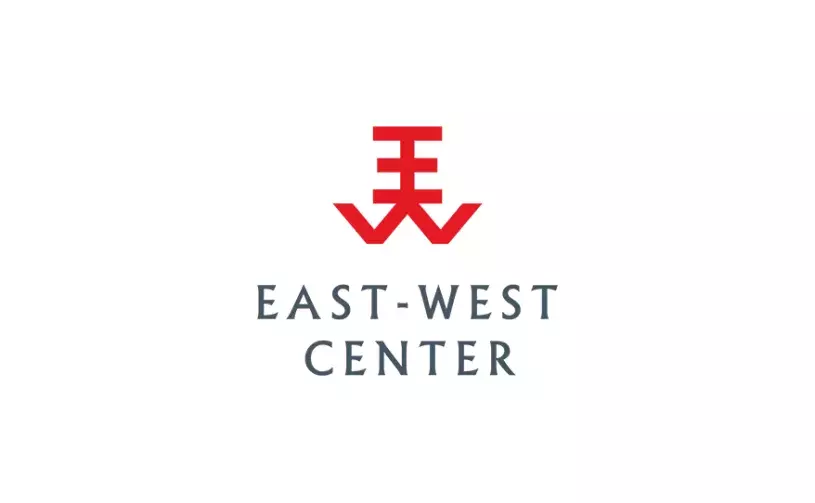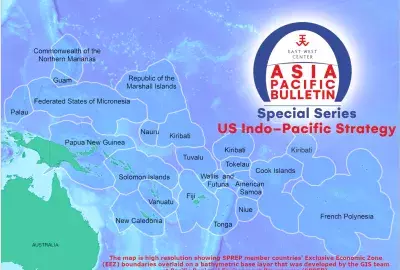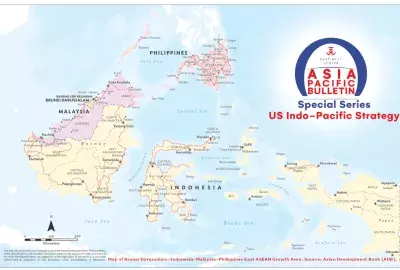Error message

| Sheena A. Valenzuela, Research Associate at the Ateneo School of Government in the Philippines, explains that: “The Philippines downplayed the threat of the virus and waited until transmission had accelerated within its borders before implementing countermeasures.” |
On November 16, a number of U.S. lawmakers, including Senators Ed Markey and Elizabeth Warren, wrote to Secretary of State Mike Pompeo, urging him to “address the alarming deterioration in human rights protection and democratic rule in Cambodia” by imposing sanctions on senior government and security officials.
This was only the most recent congressional request for action. The Gardner-Markey Asia Reassurance Initiative Act of 2018 imposed human rights and democracy-related conditions on U.S. assistance to Cambodia. The Cambodia Democracy Act of 2019 sought to freeze assets of and restrict visas for Hun Sen’s senior officials. During the Trump administration, these requests have found purchase, with the White House condemning Hun Sen’s crackdowns and curtailing some aid programs.
When the news of a mysterious illness in mainland China came to light in late December 2019, some states treated it seriously and acted with urgency to mitigate potential transmission of the disease and its harmful impacts on economic and social security. For instance, the Vietnamese government recognized the coronavirus outbreak as a threat early on. In a statement on January 27, 2020, Vietnamese Prime Minister Nguyen Xuan Phuc likened the fight against the coronavirus to “fighting against enemies” and stressed that “the Government accepts economic losses to protect the lives and health of people”. Three days after the pronouncement, Vietnam closed its shared borders with China and banned flights to and from its neighbor. Vietnam adopted these measures despite the fact that its economy is closely linked to China, its largest trading partner.
On the other hand, the Philippines downplayed the threat of the virus and waited until transmission had accelerated within its borders before implementing countermeasures. When the first COVID-19 case was reported in the country on January 30, the public became increasingly worried and some groups called for a ban on flights from China. However, Philippine President Rodrigo Duterte stated that he was not keen on stopping tourist traffic from China, as “it would not be fair.” Department of Health (DOH) Secretary Francisco Duque III supported Duterte’s position, saying that a ban “would be tricky” and that it would spark “political and diplomatic repercussions” because the virus was not confined to China alone. Analysts were puzzled by this statement — why was the health secretary talking about diplomacy when his mandate is to secure public health?
As the public began scrambling for protective medical and sanitation equipment, Presidential Spokesperson Salvador Panelo clarified on January 31 that the government could not distribute face masks to the vulnerable population due to a shortage of stock. Yet a few days prior to Panelo’s statement, the government had proudly announced a donation of masks worth $1.4 million to Wuhan. In addition, the Chinese government purchased about 3.16 million masks from Manila on January 26 — masks that could have been secured for domestic use. When the Philippine government imposed a lockdown on March 17, it was too late because the ‘enemy’ in the form of the novel coronavirus had already penetrated the country.
On March 28, the Philippine Department of Health announced that they discarded some test kits donated by China because they were only 40% accurate. The following day, the department backpedaled and apologized after the Chinese Embassy denied the claim, calling the remarks “irresponsible.” Meanwhile, European governments such as Spain, Turkey, and the Netherlands returned Chinese-made testing kits and medical masks for being defective or below standard.
From the very beginning of the pandemic, the Duterte administration granted favorable treatment to China. In early May it allowed Philippine Offshore Gaming Operations (POGOs) with sizable Chinese manpower and assets to re-open. The domestic Philippine economy only began reopening in June, even as COVID-19 cases steadily increased. The government justified economic reopening by claiming that it lacked further funds to aid Filipinos who had lost their jobs and livelihoods during the lockdown, even though it had secured over $7.76 billion in loans to finance the COVID-19 response.
Despite the Philippine government’s full accommodation of China, Beijing has yet to deliver on promised aid and investments worth billions of dollars. Four years on from the Philippines’s pivot toward China, Duterte's term is already approaching its end in 2022, but only a handful of Chinese-funded infrastructure projects have started. Furthermore, China has continued to conduct illegal activities in the highly contested waters of the South China Sea, especially within the Philippines’s exclusive economic zone (EEZ). On August 10, 2020, the Philippine Navy identified two Chinese vessels illegally surveying Reed Bank, an underwater reef formation within the Philippine EEZ that potentially contains large reserves of oil and natural gas. If the Philippine government defaults on repayment of an infrastructure loan from China, under the loan agreement, Beijing could seize Reed Bank. China is known to use ‘debt-trap diplomacy’ with developing countries, a strategy in which a creditor country extends exorbitant loans to debtor countries and extracts economic concessions when a debtor defaults on a loan payment.
Duterte’s policy on Chinese aggression in the West Philippine Sea (WPS) has always been to avoid confrontation. Notably, during his July 27 State of the Nation Address, Duterte stated that he is "useless" when it comes to the WPS. This policy also explains why he banned the military from participating in WPS joint maritime drills with the United States, a decision that was welcomed by Beijing. According to Philippine maritime experts, Duterte’s decision was a “missed opportunity” to improve the navy’s operational capabilities in the region.
At the time of this writing, the Philippines has almost 150,000 COVID-19 cases, the highest in Southeast Asia. In contrast, Vietnam’s handling of the COVID-19 crisis became a success story, recording fewer than 1,000 cases, despite being a developing country and sharing a border with China. The pandemic exposed not only the Philippine healthcare system’s lack of capacity and preparedness in responding to the disease, but also vulnerabilities arising from the country’s pivot to China. The Duterte administration’s failure to adopt decisive measures against COVID-19 shows that it is more scared of displeasing China than of the threat of the virus, and the entire country is now paying the price in lives lost and a shattered economy. No amount of donations, aid, or loans from China will be enough to compensate for the loss of lives and the suffering of the Filipino people. But it is never too late for the Philippine government to change its course, prioritize its interests, and protect its sovereignty.
| Sheena A. Valenzuela, Research Associate at the Ateneo School of Government in the Philippines, explains that: “The Philippines downplayed the threat of the virus and waited until transmission had accelerated within its borders before implementing countermeasures.” |
On November 16, a number of U.S. lawmakers, including Senators Ed Markey and Elizabeth Warren, wrote to Secretary of State Mike Pompeo, urging him to “address the alarming deterioration in human rights protection and democratic rule in Cambodia” by imposing sanctions on senior government and security officials.
This was only the most recent congressional request for action. The Gardner-Markey Asia Reassurance Initiative Act of 2018 imposed human rights and democracy-related conditions on U.S. assistance to Cambodia. The Cambodia Democracy Act of 2019 sought to freeze assets of and restrict visas for Hun Sen’s senior officials. During the Trump administration, these requests have found purchase, with the White House condemning Hun Sen’s crackdowns and curtailing some aid programs.
When the news of a mysterious illness in mainland China came to light in late December 2019, some states treated it seriously and acted with urgency to mitigate potential transmission of the disease and its harmful impacts on economic and social security. For instance, the Vietnamese government recognized the coronavirus outbreak as a threat early on. In a statement on January 27, 2020, Vietnamese Prime Minister Nguyen Xuan Phuc likened the fight against the coronavirus to “fighting against enemies” and stressed that “the Government accepts economic losses to protect the lives and health of people”. Three days after the pronouncement, Vietnam closed its shared borders with China and banned flights to and from its neighbor. Vietnam adopted these measures despite the fact that its economy is closely linked to China, its largest trading partner.
On the other hand, the Philippines downplayed the threat of the virus and waited until transmission had accelerated within its borders before implementing countermeasures. When the first COVID-19 case was reported in the country on January 30, the public became increasingly worried and some groups called for a ban on flights from China. However, Philippine President Rodrigo Duterte stated that he was not keen on stopping tourist traffic from China, as “it would not be fair.” Department of Health (DOH) Secretary Francisco Duque III supported Duterte’s position, saying that a ban “would be tricky” and that it would spark “political and diplomatic repercussions” because the virus was not confined to China alone. Analysts were puzzled by this statement — why was the health secretary talking about diplomacy when his mandate is to secure public health?
As the public began scrambling for protective medical and sanitation equipment, Presidential Spokesperson Salvador Panelo clarified on January 31 that the government could not distribute face masks to the vulnerable population due to a shortage of stock. Yet a few days prior to Panelo’s statement, the government had proudly announced a donation of masks worth $1.4 million to Wuhan. In addition, the Chinese government purchased about 3.16 million masks from Manila on January 26 — masks that could have been secured for domestic use. When the Philippine government imposed a lockdown on March 17, it was too late because the ‘enemy’ in the form of the novel coronavirus had already penetrated the country.
On March 28, the Philippine Department of Health announced that they discarded some test kits donated by China because they were only 40% accurate. The following day, the department backpedaled and apologized after the Chinese Embassy denied the claim, calling the remarks “irresponsible.” Meanwhile, European governments such as Spain, Turkey, and the Netherlands returned Chinese-made testing kits and medical masks for being defective or below standard.
From the very beginning of the pandemic, the Duterte administration granted favorable treatment to China. In early May it allowed Philippine Offshore Gaming Operations (POGOs) with sizable Chinese manpower and assets to re-open. The domestic Philippine economy only began reopening in June, even as COVID-19 cases steadily increased. The government justified economic reopening by claiming that it lacked further funds to aid Filipinos who had lost their jobs and livelihoods during the lockdown, even though it had secured over $7.76 billion in loans to finance the COVID-19 response.
Despite the Philippine government’s full accommodation of China, Beijing has yet to deliver on promised aid and investments worth billions of dollars. Four years on from the Philippines’s pivot toward China, Duterte's term is already approaching its end in 2022, but only a handful of Chinese-funded infrastructure projects have started. Furthermore, China has continued to conduct illegal activities in the highly contested waters of the South China Sea, especially within the Philippines’s exclusive economic zone (EEZ). On August 10, 2020, the Philippine Navy identified two Chinese vessels illegally surveying Reed Bank, an underwater reef formation within the Philippine EEZ that potentially contains large reserves of oil and natural gas. If the Philippine government defaults on repayment of an infrastructure loan from China, under the loan agreement, Beijing could seize Reed Bank. China is known to use ‘debt-trap diplomacy’ with developing countries, a strategy in which a creditor country extends exorbitant loans to debtor countries and extracts economic concessions when a debtor defaults on a loan payment.
Duterte’s policy on Chinese aggression in the West Philippine Sea (WPS) has always been to avoid confrontation. Notably, during his July 27 State of the Nation Address, Duterte stated that he is "useless" when it comes to the WPS. This policy also explains why he banned the military from participating in WPS joint maritime drills with the United States, a decision that was welcomed by Beijing. According to Philippine maritime experts, Duterte’s decision was a “missed opportunity” to improve the navy’s operational capabilities in the region.
At the time of this writing, the Philippines has almost 150,000 COVID-19 cases, the highest in Southeast Asia. In contrast, Vietnam’s handling of the COVID-19 crisis became a success story, recording fewer than 1,000 cases, despite being a developing country and sharing a border with China. The pandemic exposed not only the Philippine healthcare system’s lack of capacity and preparedness in responding to the disease, but also vulnerabilities arising from the country’s pivot to China. The Duterte administration’s failure to adopt decisive measures against COVID-19 shows that it is more scared of displeasing China than of the threat of the virus, and the entire country is now paying the price in lives lost and a shattered economy. No amount of donations, aid, or loans from China will be enough to compensate for the loss of lives and the suffering of the Filipino people. But it is never too late for the Philippine government to change its course, prioritize its interests, and protect its sovereignty.







